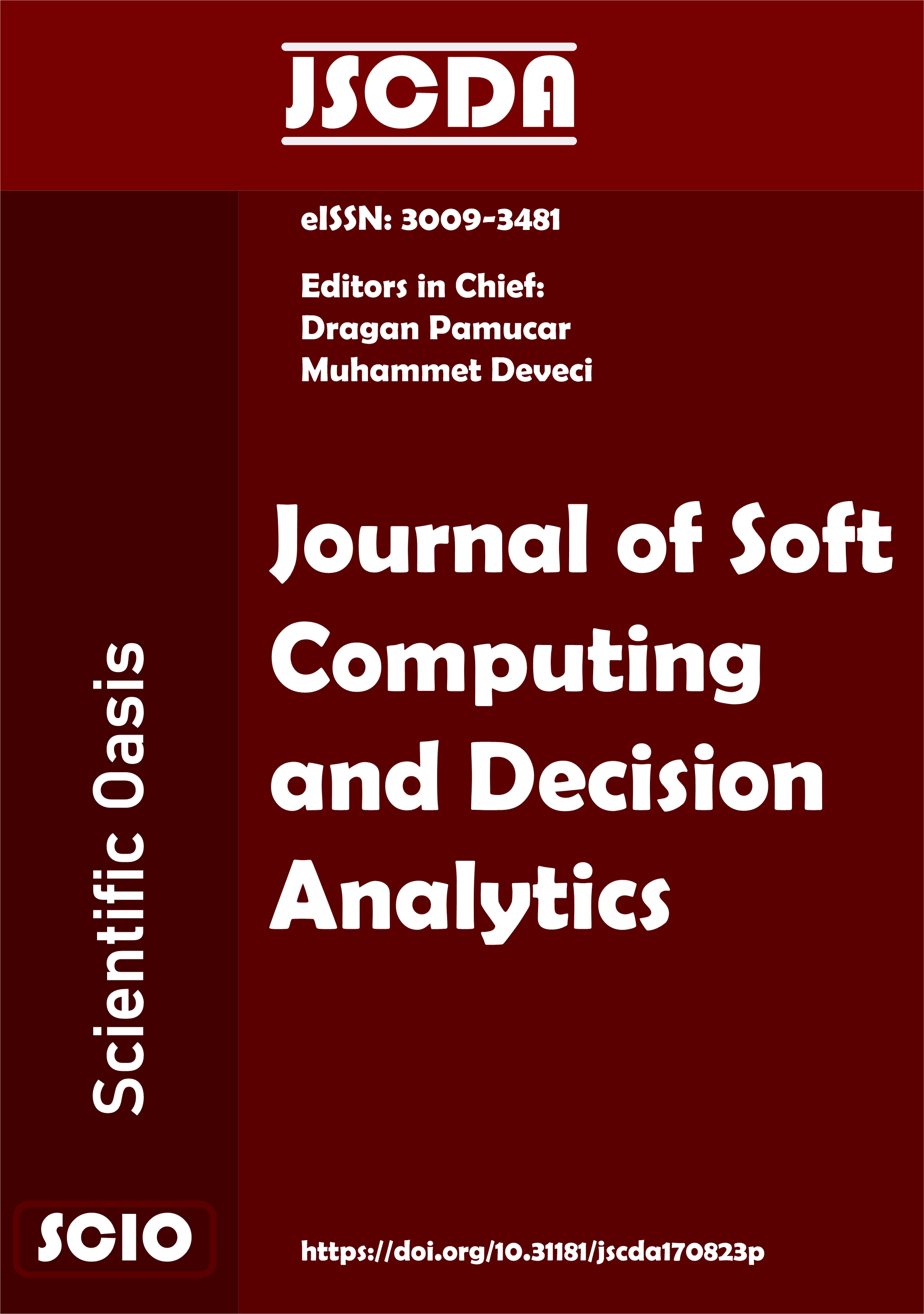The Impact of Cruise Controllability on the Decision Making of Schedule Construction
DOI:
https://doi.org/10.31181/jscda21202431Keywords:
Operations research, Transport, Aviation, Decision makingAbstract
Nowadays, challenged by diverse uncertainties and disruptions (e.g., bad weather), as well as the strict environmental regulations imposed by authorities (e.g., on carbon emissions), airlines are struggling. How to improve their operational efficiency in such a volatile and adverse market becomes a top agenda of airlines. Among various operations, crew scheduling is fundamentally important as staffing cost is a big part of the total operational expenses. It is known that in crew scheduling, “robust crew pairing” is crucial to make the produced pairings less vulnerable in real operations. Existing studies generally construct robustness assuming that the aircraft cruise speed is fixed. However, prior studies have found that flight times exhibit significant variations due to reasons like cruise speed adjustment, and aircraft can control cruise speed for purposes like reducing delays. For crew, cruise speed controllability is also useful in hedging disruptions. For example, one flight can speed up to meet its on-time arrival even if it departs late due to crew disruptions. However, the impacts of cruise speed controllability on crew pairing robustness and the related environmental costs are under-explored. We thus propose this preliminary study to explore the possibility to use cruise speed controllability to enhance schedule robustness for crews.
References
Barnhart, C., & Cohn, A. (2004). Airline schedule planning: Accomplishments and opportunities. Manufacturing & service operations management, 6(1), 3-22. https://doi.org/10.1287/msom.1030.0018
Cacchiani, V., & Salazar-González, J. J. (2017). Optimal solutions to a real-world integrated airline scheduling problem. Transportation Science, 51(1), 250-268. https://doi.org/10.1287/trsc.2015.0655
Deveci, M., & Demirel, N. C. (2018). Evolutionary algorithms for solving the airline crew pairing problem. Computers & Industrial Engineering, 115, 389-406. https://doi.org/10.1016/j.cie.2017.11.022
Haouari, M., Mansour, F. Z., & Sherali, H. D. (2019). A new compact formulation for the daily crew pairing problem. Transportation Science, 53(3), 811-828. https://doi.org/10.1287/trsc.2018.0860
Wen, X., Chung, S. H., Ji, P., & Sheu, J. B. (2022). Individual scheduling approach for multi-class airline cabin crew with manpower requirement heterogeneity. Transportation Research Part E: Logistics and Transportation Review, 163, 102763. https://doi.org/10.1016/j.tre.2022.102763
Antunes, D., Vaze, V., & Antunes, A. P. (2019). A Robust Pairing Model for Airline Crew Scheduling. Transportation Science, 53(6), 1751-1771. https://doi.org/10.1287/trsc.2019.0897
Deveci, M., & Demirel, N. Ç. (2018). A survey of the literature on airline crew scheduling. Engineering Applications of Artificial Intelligence, 74, 54-69. https://doi.org/10.1016/j.engappai.2018.05.008
Gao, C., Johnson, E., & Smith, B. (2009). Integrated airline fleet and crew robust planning. Transportation Science, 43(1), 2-16. https://doi.org/10.1287/trsc.1080.0257
Tekiner, H., Birbil, Ş. İ., & Bülbül, K. (2009). Robust crew pairing for managing extra flights. Computers & Operations Research, 36(6), 2031-2048. https://doi.org/10.1016/j.cor.2008.07.005
Wei, K., & Vaze, V. (2018). Modeling crew itineraries and delays in the national air transportation system. Transportation Science, 52(5), 1276-1296. https://doi.org/10.1287/trsc.2018.0834
Weide, O., Ryan, D., & Ehrgott, M. (2010). An iterative approach to robust and integrated aircraft routing and crew scheduling. Computers & Operations Research, 37(5), 833-844. https://doi.org/10.1016/j.cor.2009.03.024
Wen, X., Ma, H. L., Chung, S. H., & Khan, W. A. (2020). Robust airline crew scheduling with flight flying time variability. Transportation Research Part E: Logistics and Transportation Review, 144, 102132. https://doi.org/10.1016/j.tre.2020.102132
Wen, X., Sun, X., Sun, Y., & Yue, X. (2021). Airline crew scheduling: Models and algorithms. Transportation Research Part E: Logistics and Transportation Review, 149, 102304. https://doi.org/10.1016/j.tre.2021.102304
Yan, S., Tung, T. T., & Tu, Y. P. (2002). Optimal construction of airline individual crew pairings. Computers & Operations Research, 29(4), 341-363. https://doi.org/10.1016/S0305-0548(00)00070-8
AhmadBeygi, S., Cohn, A., & Weir, M. (2009). An integer programming approach to generating airline crew pairings. Computers & Operations Research, 36(4), 1284-1298. https://doi.org/10.1016/j.cor.2008.02.001
Erdoğan, G., Haouari, M., Matoglu, M. Ö., & Özener, O. Ö. (2015). Solving a large-scale crew pairing problem. Journal of The Operational Research Society, 66(10), 1742-1754. https://doi.org/10.1057/jors.2015.2
Quesnel, F., Desaulniers, G., & Soumis, F. (2019a). A branch-and-price heuristic for the crew pairing problem with language constraints. European Journal of Operational Research. https://doi.org/10.1016/j.ejor.2019.11.043
Quesnel, F., Desaulniers, G., & Soumis, F. (2019b). Improving air crew rostering by considering crew preferences in the crew pairing problem. Transportation Science. https://doi.org/10.1287/trsc.2019.0913
Saddoune, M., Desaulniers, G., & Soumis, F. (2013). Aircrew pairings with possible repetitions of the same flight number. Computers & Operations Research, 40(3), 805-814. https://doi.org/10.1016/j.cor.2010.11.003
Salazar-González, J. J. (2014). Approaches to solve the fleet-assignment, aircraft-routing, crew-pairing and crew-rostering problems of a regional carrier. Omega, 43, 71-82. https://doi.org/10.1016/j.omega.2013.06.006
Shao, S., Sherali, H. D., & Haouari, M. (2017). A novel model and decomposition approach for the integrated airline fleet assignment, aircraft routing, and crew pairing problem. Transportation Science, 51(1), 233-249. https://doi.org/10.1287/trsc.2015.0623
Yan, S., & Tu, Y. P. (2002). A network model for airline cabin crew scheduling. European Journal of Operational Research, 140(3), 531-540. https://doi.org/10.1016/S0377-2217(01)00215-6
Chung, S. H., Ma, H. L., & Chan, H. K. (2017). Cascading delay risk of airline workforce deployments with crew pairing and schedule optimization. Risk Analysis, 37(8), 1443-1458. https://doi.org/10.1111/risa.12746
Yen, J. W., & Birge, J. R. (2006). A stochastic programming approach to the airline crew scheduling problem. Transportation Science, 40(1), 3-14. https://doi.org/10.1287/trsc.1050.0138
Muter, İ., Birbil, Ş. İ., Bülbül, K., Şahin, G., Yenigün, H., Taş, D., & Tüzün, D. (2013). Solving a robust airline crew pairing problem with column generation. Computers & Operations Research, 40(3), 815-830. https://doi.org/10.1016/j.cor.2010.11.005
Shebalov, S., & Klabjan, D. (2006). Robust airline crew pairing: Move-up crews. Transportation Science, 40(3), 300-312. https://doi.org/10.1287/trsc.1050.0131
Dunbar, M., Froyland, G., & Wu, C. L. (2012). Robust airline schedule planning: Minimizing propagated delay in an integrated routing and crewing framework. Transportation Science, 46(2), 204-216. https://doi.org/10.1287/trsc.1110.0395
Sun, X., Chung, S. H., Choi, T. M., Sheu, J. B., & Ma, H. L. (2020). Combating lead-time uncertainty in global supply chain's shipment-assignment: Is it wise to be risk-averse? Transportation Research Part B: Methodological, 138, 406-434. https://doi.org/10.1016/j.trb.2020.05.015
Aktürk, M. S., Atamtürk, A., & Gürel, S. (2014). Aircraft rescheduling with cruise speed control. Operations Research, 62(4), 829-845. https://doi.org/10.1287/opre.2014.1279
Arıkan, U., Gürel, S., & Aktürk, M. S. (2016). Integrated aircraft and passenger recovery with cruise time controllability. Annals of Operations Research, 236(2), 295-317. https://doi.org/10.1007/s10479-013-1424-2
Arıkan, U., Gürel, S., & Aktürk, M. S. (2017). Flight network-based approach for integrated airline recovery with cruise speed control. Transportation Science, 51(4), 1259-1287. https://doi.org/10.1287/trsc.2016.0716
Duran, A. S., Gürel, S., & Aktürk, M. S. (2015). Robust airline scheduling with controllable cruise times and chance constraints. IIE Transactions, 47(1), 64-83. https://doi.org/10.1080/0740817X.2014.916457
Gürkan, H., Gürel, S., & Aktürk, M. S. (2016). An integrated approach for airline scheduling, aircraft fleeting and routing with cruise speed control. Transportation Research Part C: Emerging Technologies, 68, 38-57. https://doi.org/10.1016/j.trc.2016.03.002
Şafak, Ö., Çavuş, Ö., & Selim Aktürk, M. (2018). Multi-stage airline scheduling problem with stochastic passenger demand and non-cruise times. Transportation Research Part B: Methodological, 114, 39-67. https://doi.org/10.1016/j.trb.2018.05.012
Şafak, Ö., Gürel, S., & Aktürk, M. S. (2017). Integrated aircraft-path assignment and robust schedule design with cruise speed control. Computers & Operations Research, 84, 127-145. https://doi.org/10.1016/j.cor.2017.03.005
EUROCONTROL. (2009). Base of aircraft data (BADA) aircraft performance modelling report.
Dunbar, M., Froyland, G., & Wu, C. L. (2014). An integrated scenario-based approach for robust aircraft routing, crew pairing and re-timing. Computers & Operations Research, 45, 68-86. https://doi.org/10.1016/j.cor.2013.12.003
Downloads
Published
Issue
Section
License
Copyright (c) 2024 Scientific Oasis

This work is licensed under a Creative Commons Attribution-NonCommercial-NoDerivatives 4.0 International License.
















